The Lawmatics Blog
Insights on legal marketing, automating the law practice, and legal tech in general
Law firm automation is the practice of centralizing and deploying repetitive, everyday administrative tasks at scale. It achieves this by linking every step of the client journey in one system to automate task triggers, emails, population forms, and reminders.
Legal workflow automation software like Lawmatics doesn’t replace attorneys but enhances them. It integrates with tools like Clio, MyCase, and PracticePanther for full workflow visibility.
Benefits of Legal Workflow Automation for Attorneys
Improved client intake speed and accuracy
Lawyer automation (or attorney automation) tools eliminate manual data entry and automate repetitive tasks at every step of intake, from confirming form submissions to client relationship management (CRM) data entry.
By automating processes like follow-up messaging and scheduling, teams can ensure faster responses and fewer client drop-offs.
As just one example, Lawmatics’ new QualifyAI tool automatically scores and prioritizes incoming leads based on engagement and case fit. This empowers teams to achieve an instant response time.
QualifyAI (and all other Lawmatics tools) is built on trusted internal workflows that help standardize processes and capture complete client information every time.
Reduced human error
Humans are, of course, essential to the operations of any legal practice, and that’s not changing any time soon. But law firms are busy environments, and in all the hustle and bustle, even the most skilled workers can make mistakes.
Legal workflow management software replaces manual document handling and repetitive data entry with automated templates and workflows. This prevents costly miscommunications and prevents tasks from falling through the cracks.
Automated task assignments and reminders also help prevent missed deadlines. For example, Lawmatics enables data sync across multiple systems, including Clio and MyCase, which further reduces inconsistencies.
Centralized data and transparent reporting
Legal practices should keep client data, communications, and metrics in one dashboard to prevent silos. Such centralization also gives managing partners visibility into firm performance and pipeline health in real time. Team members can make big strategic decisions with clarity.
Lawmatics comes with custom reporting tools that make it easy to tie marketing and intake directly to demo requests and revenue.
Streamlined follow-up and client communication
Strong client communication is at the heart of any successful legal team.
Legal workflow automation software allows teams to maintain consistent client contact through automated follow-up emails, reminders, and nurture sequences. With this set up, prospects remain engaged from first inquiry through signed retainer without laborious manual interview.
Lawmatics’ comes with built-in features, like text messaging for law firms, that allow teams to talk to clients and ensure no lead goes untouched.
Increased capacity without adding headcount
Labor costs are among the biggest concerns for a law firm. By automating tasks, law firms can scale their operations efficiently, handling more matters without expanding staff.
QualifyAI from Lawmatics empowers teams to convert more clients with less effort by routing qualified leads directly into workflows.
Lawmatics connects intake, CRM, and drip email marketing software for lawyers. This allows small firms to operate like large ones, using predictive insights that drive faster growth.
Core Legal Workflows Lawyers Can Automate
Legal document automation software has the potential to transform every essential task.
Client intake
Thanks to the large amounts of paperwork that it demands, the client intake process is the most lengthy part of any client lifecycle. Teams who use software can save time with automated intake forms, e-signatures, and data that syncs directly within the CRM.
Lawmatics’ built-in intake automation capabilities connect to follow-up workflows. Teams can save the effort involved in tracking down every client, sending reminders about pending documents like retainer agreements, and manually scheduling next steps.
Through QualifyAI, Lawmatics uses AI-powered lead scoring for law firms to accelerate intake by prioritizing the highest-value prospects first.
Marketing & follow-up
Firms that want to move beyond word-of-mouth client acquisition often spend a significant budget on marketing. Automation software can help reduce these costs by increasing conversation rates and decreasing acquisition costs through triggered drip campaigns, SMS updates, and personalized nurture sequences.
Lawmatics automates all of these processes within one unified dashboard. It makes it easy for teams to assess their marketing return on investment (ROI) at a glance. In turn, they save time and effort on reporting as well as on managing campaigns.
Case Management & communication
Clients who receive an exceptional experience are more likely to turn into promoters. However, firms chasing this exceptional experience can’t afford to miss deadlines or go radio silent during a retainer.
Lawmatics offers task reminders, automated deadlines, and document workflows to make sure every client feels cared for and prioritized. It can even sync with Clio and MyCase to ensure firm-wide synchronization.
Time tracking & billing
Billing and time tracking is an essential part of any law firm’s practice. If invoices are inaccurate, it can have implications on overall company margins,revenue, and reputation.
Lawmatics’ time-tracking tools link directly to invoicing systems, giving firms visibility into productivity and client value per matter. It empowers teams to make strategic, data-driven decisions about internal staffing needs and how to allocate capacity across clients.
5 Steps to Legal Workflow Automation
Law firm automation doesn’t happen overnight, but the process itself is generally straightforward and easy. Here’s how to make it happen.
Step One: Map your current legal workflows
To identify whether your team is a good fit for attorney automation, begin by mapping your legal workflows as they currently exist.
Then, either individually or together as a team, try to identify bottlenecks in intake, communication or billing. Based on the gaps you’ve identified, start writing possible solutions to those gaps. This will give you a list of which features to look for in a tool.
Step Two: Select the right legal workflow automation software
There are many automated legal platforms available on the market. While you’ll want to look for ones that provide the features you’ve indicated in Step One, there is another important factor to consider.
Look for a solution that integrates with your current tech stack. This ensures you can maintain the current operations that are working for you and discard those that aren’t.
Step Three: Start small with high-impact automation
Automation is powerful and, as a result, should be used carefully. It can be tempting to automate everything at once, but this can be quite overwhelming for a team.
Start with one process. Client intake automation is a great place to start. Then, measure results. If you see a positive change, you can move on to the next automation.
Step Four: Train your team for adoption and success
Law firm success depends on the output of the whole team. You need everyone on board in order for your automation efforts to be successful.
The best way to set your team up for success is by providing clarity and templates where possible. Most automation software is easy to learn. But, it can be helpful to go with a system that offers dedicated support in the first few months.
Step Five: Monitor and optimize your automated workflows
There are a few important reasons to monitor and optimize your automated workflows:
- To make sure everything you’ve implemented is serving both the team and the client.
- To make sure you’re receiving a great ROI from your software.
Lawmatics comes with a built-in reporting dashboard that makes it easy to track efficiency gains. Request a demo to see how Lawmatics can help you automate your specific legal workflows.
Common Legal Workflow Automation Challenges and How to Overcome Them
Lawyer automation software is generally simple to implement with amazing returns. However, it’s best to be aware of the possible challenges before you start an engagement. Here are some of the most common issues that law firms run up against:
- Fear of disruption: Fear of change is normal, and if change is associated with disruption and discomfort, the fear can be even worse. It can be hard to sell change-resistant teams on a new tool, especially if they think it’s going to make their job harder.
- Integration fatigue: Most teams have been through countless tools, which means multiple logins and multiple opportunities for headaches. It can be hard to sell a team on a new tool if they don’t truly believe it will make their lives easier.
- Inconsistent workflows: If a team is working on a shaky workflow foundation, it can be hard to know where to begin with automation.
Lawmatics answers all of the above concerns by unifying legal CRM software, automation, intake, and analytics in one easy-to-use platform. Plus, Lawmatics integrations connect with the software your team already uses every day, reducing the time your team spends juggling different systems.
The Future of Legal Workflow Automation: AI-Driven Efficiency
The next wave of legal workflow automation isn’t just about triggering tasks. It’s about software that can anticipate what needs to happen next.
With modern AI workflow automation, your systems can spot patterns in client behavior, score new inquiries, and trigger the proper follow-ups automatically—without adding more work to your team.
That’s where Lawmatics’ QualifyAI comes in. Built directly into Lawmatics' legal CRM, QualifyAI is a sophisticated lead-scoring automation engine designed specifically for law firms. Instead of treating every inquiry the same, it:
- Analyzes client behavior (form submissions, email engagement, response times).
- Reviews communication history and intake answers.
- Interprets engagement signals across your marketing and intake touchpoints.
From there, QualifyAI automatically ranks leads based on fit and intent, so your team knows exactly who to call first.
The benefits are immediate:
- Saves time qualifying leads by replacing manual gut checks with consistent, data-driven scoring.
- Prioritizes high-value clients, ensuring your best opportunities get a faster, more focused response.
- Improves marketing ROI by connecting campaigns and channels to the leads that actually convert.
By pairing AI-driven lead scoring with automation across intake, communication, and reporting, Lawmatics is helping firms move from reactive to truly proactive operations. It’s a clear example of how AI doesn’t replace attorneys—it gives them better information, faster, so they can make stronger decisions.
As AI continues to advance, firms that embrace data-driven workflows will gain a lasting edge: fewer bottlenecks, more predictable growth, and a practice that runs as intelligently behind the scenes as the lawyers who lead it.
Transform Your Firm’s Legal Workflow with Lawmatics
Automation isn’t just about convenience for staff. It’s one of the most reliable ways for law firms to increase profitability and deliver a stronger client experience.
By removing repetitive manual tasks, firms can operate with more consistency, more speed, and far fewer administrative bottlenecks.
Lawmatics makes this possible by streamlining every workflow from initial intake through engaging repeat clients. Its unified system gives firms complete transparency into what’s happening at each stage of the client journey.
Backed by real-time legal analytics and reporting tools, it helps teams make confident, data-driven decisions. QualifyAI pushes these gains even further, giving firms predictive insight into their best opportunities. This way, they can prioritize the right clients at the right moment.
Request a demo to see how Lawmatics transforms legal operations.
Frequently Asked Questions
How can automation help my law firm?
Automation increases efficiency, reduces human error, and helps firms scale without hiring more staff. It frees attorneys from administrative work so they can focus on strategic, billable client work.
What legal tasks can be automated?
Tasks like client intake, document generation, follow-ups, billing, scheduling, and marketing outreach are all strong candidates for automation.
Is legal workflow automation only for large firms?
Not at all. In fact, small and midsize firms often stand to gain the most from automation.
Large firms may use enterprise systems to streamline complex, multi-department workflows. Meanwhile, smaller firms may rely on automation to offset limited staff, improve consistency, and scale client intake without adding headcount.
How does Lawmatics support automation?
Lawmatics combines CRM, client intake, and a legal marketing automation platform into one. The whole platform is supported by QualifyAI, which automatically scores and prioritizes leads for faster response times.
Will automation replace lawyers?
No. Automation handles repetitive tasks so attorneys can focus on legal strategy, client relationships, and work that requires human judgment.
Why automate legal workflow processes?
Automation saves time, reduces errors, and creates consistent, streamlined workflows. It helps firms boost productivity, enhance client satisfaction, and scale without expanding staff.
In the intricate domain of family law, where emotions run high and the stakes are personal, mastering your workflows is more than a strategy; it’s a commitment to excellence and empathy. Our latest Deep Dive Webinar peeled back the layers of family law workflows in Lawmatics, revealing a wealth of strategies for automation, personalization, and seamless client interaction.This recap offers a distilled view of our comprehensive webinar, guiding you through the pivotal stages of automating client onboarding, executing conflict checks with precision, and nurturing client relationships with automated yet heartfelt communication. Watch as our product manager, Devon, explores the unique benefits for family law practices using Lawmatics, illustrating practical applications that can revolutionize your approach to client intake.
Webinar Timestamps
0:00 - Introduction and Overview
Lawmatics product manager, Devon Roth, welcomes participants and sets the stage for exploring family law workflows with Lawmatics, highlighting the webinar's goal to enhance process efficiency through automation and custom dashboards.
4:30 - Family Law Automations and Conflict Checking
Devon delves into family law automations, emphasizing their role in streamlining communication and conflict checking. She goes on to showcase how automations ensure accurate and timely management of leads and clients.
4:54 Pipeline and Initial Contact Form Automation
Devon details on automating the client journey from initial contact, focusing on moving new leads through the pipeline and initiating templated emails, alongside automated conflict checks based on lead information.
10: 16 Drip Campaigns and Client Engagement
A thorough explanation of drip campaigns in maintaining potential client engagement, with insights on automated communications to prompt consultation scheduling and the use of conditional logic for personalized email and SMS communications.
17:38 Consultation Scheduling, Confirmation, and Follow-up
Devon outlines the automation process for moving leads to the 'consult scheduled' stage and setting up appointment confirmations and reminders. Also addresses handling no-shows and cancellations to ensure rescheduling.
31:01 Post-Consultation Engagement and Retainer Agreement
The presentation wraps with post-consultation steps including sending retainer agreements via automation, utilizing e-signature documents, and the process of converting a potential new client to a hired status, emphasizing continued engagement and relationship formalization.
With the legal industry poised for 5.18% annual growth, innovation is key in the face of evolving client demands and growing caseloads. Top law firms are expanding their client base with smart marketing and improved services — all while optimizing their operations for agility and efficiency.In this roundtable discussion, our panel of industry experts shared their insights into building sustained financial health and commercial success.
Panelists

Matt Spiegel
Co-founder & CEO,Lawmatics

Ashley Robinson
CEO & Founder,Green Cardigan Marketing

Bonnie Faucett
CEO & Founder,Legacy System

Gyi Tsakalakis
President & Co-founder,AttorneySync
Time stamps of key takeaways
0:00 — Introductions
Get to know our panel! They have a vast range of expertise in the legal industry as marketers and attorneys themselves, in practice areas spanning from estate planning to criminal defense.
7:16 — Pillar 1: Marketing
Throwing money at marketing won’t fix your problems without a strategy. It’s about attracting the right clients, accelerating growth, and minimizing lead attrition. Here, our experts break down the relationship between getting clients in the door and creating value for your firm.
30:25 — Pillar 2: Operations
Streamlining operations is about making the most of what you have. Increasing bandwidth and eliminating redundant manual work is the first step to freeing up your team to give more personal and specific attention to your clients.
51:05 — Pillar 3: Client relationship management
This section is about driving referrals and repeat business. The key here is in creating quality experiences that turn former clients into evangelists for your firm. Our experts give some advice on how to cultivate these relationships throughout the client journey, from increasing initial retention to boosting the firm’s reputation through reviews and referrals.
101:53 — Conclusion
Our speakers provide some closing thoughts, recap important themes, and answer a few questions from the live chat.
Webinar slide deck
The Business Intelligence Group has named Lawmatics a 2024 Best Place to Work award. This recognition honors organizations fostering exceptional employee experiences and driving exceptional performance through vibrant and engaging work environments.“At Lawmatics, we’ve worked hard to cultivate an environment where everyone is empowered to show up as their authentic selves and take ownership of their craft,” said Lawmatics CEO and Co-founder Matt Spiegel. “We’ve achieved what we have as a company because we’re lucky enough to have fantastic people deeply motivated to do meaningful, high-quality work.”Maria Jimenez, chief nominations officer of Business Intelligence Group, commended the commitment of Lawmatics to employee well-being and excellence."Congratulations to Lawmatics for creating a workplace culture that prioritizes employee well-being and fosters excellence," she said. "This recognition is a testament to your dedication to building a strong and engaged workforce, even amidst challenging times. We commend your commitment to listening to employee feedback and taking action to create a truly exceptional work environment."Lawmatics was previously a finalist as a Best Place to Work in 2023. The organization’s devotion to the spirit of collaboration also manifests in dynamic partnerships with organizations including the State Bar of Texas and legal tech providers attorneys use every day, from Clio to CallRail. The CRM won Product of the Year at the 2023 Sales and Marketing Technology Awards, was previously a finalist as a Best Place to Work in 2023 and is most recently a 2024 Steve Awards finalist.
As the foreign-born population surpassed 46 million in 2022, immigration lawyers have an expanding potential client base. Concurrently, the immigration system is straining under an enormous backlog–with over 2 million pending cases as of October 2023, triple the amount from 2017. This backlog decelerates case resolutions and imposes considerable challenges on law firms, including extended case durations and increased client uncertainty.Immigration law firms must adopt targeted marketing strategies that are client-centric to generate leads, offering security, flexibility, and resilience for their clients.Immigration law firms must blend innovative outreach with operational efficiency. By doing so, they can distinguish themselves and thrive in a demanding legal environment.
Strategic marketing assessment for immigration law firms
Before strengthening your marketing strategies, we need to take a step back and assess your marketing and technology assets. We want to get a holistic picture of acquiring and retaining clients.
Checklists for evaluating your digital marketing assets
Evaluating your firm's digital marketing foundation is crucial to establishing a competitive edge. Let's look at your online presence for its effectiveness in connecting with and captivating your target audience.
Quick website audit
Your website serves as the digital front door to your firm. Look at your website with fresh eyes and without assumptions. Does your website accurately represent your brand and the services you offer?Walk through this short checklist:
- Branding
- Does the website clearly display the firm's name and logo?
- Is the firm's unique value proposition or mission statement prominently featured?
- Services offered
- Are the immigration services offered listed and explained (e.g., Visas and Temporary Status, Citizenship and Permanent Residency, Special Programs)?
- Is there clear information on specialized practice areas within immigration law (e.g., asylum, deportation defense, employment-based immigration)?
- Are there case studies or examples of successful cases to illustrate these services?
- Target audience
- Is there a clear statement about who the firm serves (e.g., students, families, businesses)?
- Does the website address specific challenges or concerns of each target audience segment?
- Are there testimonials or client stories that resonate with these target audiences?
- Contact information
- Is the contact information prominently displayed (phone number, email, office location)?
- Is there an easy-to-use contact form available?
- Are there direct links to the firm’s social media profiles for further engagement?
Content review
Content is a key component of your firm's online presence, helping to establish your expertise in immigration law and SEO authority.
- Blog
- Are blog posts regularly published with relevant, informative content?
- Do blog topics cover a wide range of immigration issues and updates?
- Is there a consistent voice and style that reflects the brand's personality?
- Videos/podcasts
- Are multimedia elements like videos or podcasts being used to engage the audience?
- Do these videos/podcasts cover informative and relevant topics to your audience?
- Is there a schedule for releasing new videos or podcast episodes to keep the audience engaged?
- Authority building
- Does the content position the firm as a knowledgeable authority in immigration law?
- Are there articles or posts that showcase your lawyers' expertise and achievements in the field?
- Is the content shared across other platforms or publications to widen reach and credibility?
Marketing strategies for immigration law firms
Alright, so we have our foundation and a solid website. Let’s look at how you can refine sophisticated marketing strategies to stand out and reach your target audience. Given the unique challenges and opportunities in immigration law, it’s imperative to develop tailored marketing tactics that attract potential clients and foster long-lasting relationships.

Maximizing referral potential
Referral marketing is definitely one of the best and most crucial channels for client acquisition and your firm's growth. The ABA Model Rule 7.2 permits you to ask for referrals from clients and participate in referral programs but prohibits compensating anyone for recommending the lawyer's services (except paying a qualified lawyer referral service)- so check your local rules to make sure you comply.You need to spend time cultivating and diversifying your referral channels. Adopt a proactive and strategic approach to turn referrals into a robust and steady source of new business. Here are some great ways to really capitalize on referral marketing.
1Enhancing client relationships
Of course, you are already working toward building strong, trust-based relationships with your clients. Improve your client service by:
- Scheduling regular check-ins with clients during and after their matter resolution.
- Send personalized thank-you notes to show gratitude and foster goodwill.
- Provide educational resources that empower your clients, enhancing their understanding of their matter.
- Send out client feedback surveys to gauge client satisfaction and areas for improvement.
2Leveraging testimonials and reviews
Ask active clients to share their positive experiences with your firm through a testimonial or review. While direct incentives for referrals are not permissible, satisfied clients often willingly provide testimonials or online reviews.
- Follow up with clients to request testimonials or online reviews after a successful case resolution. You can provide clients with questions to help guide their testimonials, making it easier for them to provide meaningful feedback.
- Feature client testimonials prominently on your website and office, ensuring compliance with ethical guidelines.
- Monitor and professionally respond to online reviews to enhance your firm’s reputation.
3Staying in touch
Keeping in touch with leads or former clients to keep the firm top-of-mind may indirectly lead to referrals.
- Send regular newsletters to your clients with updates on immigration law, case studies, and relevant legal tips.
- Send holiday, milestone, or birthday greetings to former clients to maintain a warm relationship.
- Share anonymized success stories in your communications to showcase your firm’s effectiveness.
4Professional network alliances
Forge alliances with other professionals who often interact with potential clients, like community leaders or other legal specialists. Collaborate on initiatives like educational workshops, which can indirectly lead to referrals.
- Actively participate in associations or groups focusing on immigration, such as the American Immigration Lawyers Association (AILA).
- Host educational or networking events aimed at professionals in compatible fields, such as cultural community groups, universities, businesses, ESL teachers, etc.
- Create joint content like CLEs, webinars, or articles with other lawyers or compatible professionals.
- Maintain consistent communication with your network to reinforce your relationships.
5Tracking and analyzing referrals
Incorporate a referral tracking mechanism into your CRM to keep tabs on where new inquiries are coming from. Analyze this data to identify your most productive referral sources and adjust your strategies as needed.
- Have your team score the quality of the referrals by channel so you can see where your best quality matters are coming from.
- Include a cost analysis of acquiring clients through different referral sources.
- Monitor the success rate of cases coming through referrals to assess the quality of these leads.
- Track how actively engaged your referral sources are over time (e.g., how frequently they refer clients).
- Look for trends and patterns in your referral data over time, such as seasonal variations or changes in referral behavior.

SEO priorities for immigration law firms to boost online visibility
You need an SEO strategy, even a simple one, to establish a commanding online presence. SEO is a complex, evolving field, and staying ahead requires a strategic, long-term approach. The top three SEO strategies outlined here are designed to be impactful and sustainable investments for your firm, ensuring you effectively reach and engage your target audience.
1Produce high-quality, educational content
Resonate with your audience by creating high-quality, educational content. Go deep into the concerns and questions that are most relevant to your potential clients. Your firm will become a trusted resource and improve its online visibility and search engine rankings by producing rich, informative content that addresses these issues in an accessible manner.
- In-depth client issue analysis: What are your clients worried about? What questions is your intake team always answering? Answer these questions, and use tools like Google Trends or keyword research to capture what potential clients are searching for regarding immigration law.
- Rich content creation: Develop comprehensive articles, guides, and FAQs that address these client concerns in a clear, informative manner, avoiding legal jargon and empowering your clients.
- Utilize various formats: Incorporate various content formats like infographics, downloadable guides, and blog posts for a broader appeal.
- Expert contributions: Collaborate with immigration experts for guest articles to enhance credibility and provide diverse insights.
2Leverage video marketing for enhanced engagement
Video marketing offers a dynamic way to connect with and educate your audience because it shows off your personality, communication skills, and expertise. By producing a range of video content on immigration topics, your firm can effectively engage potential clients.
- Establish a YouTube channel: Create a dedicated channel for immigration law education using SEO-optimized video titles, descriptions, and tags.
- Diverse video content: Produce different kinds of videos, including explainers, client testimonials, and case studies, to cater to viewer preferences.
- Interactive webinars: Host live sessions and webinars to directly engage with your audience, providing a platform for Q&As and real-time discussions.
3Optimize for local SEO
Local SEO is where you target clients in your geographic areas. Here are four ways to get local visibility:
- Google My Business optimization: Claim and optimize your Google My Business listing to improve local search visibility.
- Consistent NAP information: Ensure your firm's name, address, and phone number are consistent across all online directories and your website.
- Local keywords: Include location-based keywords in your website's content and metadata to effectively target local clients.
- Local community engagement: Participate in local community events and share these activities on your website and social media channels.
Checklist: additional technical SEO activities for immigration law firms
Going beyond the basics, numerous technical SEO activities can further enhance your firm's online presence. Each of these tasks helps fine-tune your website to be more discoverable and appealing to search engines and potential clients.
- Conduct regular technical SEO audits to identify and fix issues like broken links, crawl errors, and slow page loading speeds.
- Use SSL encryption to secure your website, as HTTPS is a ranking factor for Google.
- Optimize your website’s architecture for easy navigation and effective indexing by search engines.
- Ensure your website is fully responsive and provides an optimal viewing experience on mobile devices.
- Implement accelerated mobile pages (AMP) for faster loading times on mobile.
- Test your website’s mobile usability regularly using tools like Google's Mobile-Friendly Test.
- Engage in ethical backlink building by contributing guest posts to reputable legal and immigration-related websites and blogs.
- Participate in legal forums and discussions, providing valuable insights and including a link to your website where relevant.
- Collaborate with other legal professionals and industry influencers for joint content creation or webinars, which can provide backlink opportunities.
- Implement schema markup on your website to help search engines better understand the content of your pages (e.g., markup for articles, attorney profiles, and FAQs).
- Use structured data to enhance your search results with rich snippets, which can improve click-through rates.

Multilingual capabilities as a client-centric marketing strategy
Offering multilingual services demonstrates a commitment to inclusivity and can differentiate you as an accessible and client-focused immigration lawyer.
Integrating multilingual offerings into marketing
Effective marketing in immigration law requires demonstrating an understanding of and respect for the diverse backgrounds of your clients. Integrating multilingual offerings into your marketing strategies is more than just a service feature; it's a testament to your firm's commitment to inclusivity and cultural competence.
- Deploy multilingual content to connect with specific communities across appropriate channels.
- Spotlight your cultural competence and multilingual capabilities as a cornerstone of your value proposition.
- Ensure website and digital content reflect multilingual accessibility.
Promoting specialized staffing and resources
Your team's language abilities and cultural knowledge are tremendous assets! Showcasing these skills in your marketing can build trust and rapport with potential clients from various backgrounds.
- Showcase language abilities and cultural expertise on all platforms.
- Introduce client-facing staff with relevant language skills and experience.
- Tout extensive multilingual materials and translation services.
Assessment of client-centric marketing impact
To evaluate the effectiveness of your client-centric marketing efforts, focus on how well your strategies align with and address the needs of your diverse client base. Analyze data from your marketing campaigns to see if they're reaching and resonating with the intended audiences.Here's a streamlined checklist to support your evaluation:
- Multilingual messaging impact: Review how well your marketing communications highlight language services and resonate with target segments.
- Market penetration analysis: Examine the depth of your marketing reach within different cultural communities and how effectively it engages these audiences.
- Trends in client acquisition: Monitor the rate of new client engagements from various linguistic groups to evaluate the direct impact of your targeted marketing efforts.
- Competitive benchmarking: Compare your marketing reach and client feedback with your competitors to identify gaps or improvement opportunities.
This approach ensures that your marketing strategies are comprehensive and precisely tailored to meet the nuanced needs of a diverse client base, thereby enhancing overall client acquisition and retention.

Leveraging PPC and digital ads for immediate lead generation
For immigration law firms seeking immediate client leads while building long-term SEO and referral networks, Pay-Per-Click (PPC) advertising is a great tool to add to your marketing toolkit. PPC works by strategically placing ads on search engines and social media platforms. You can directly target potential clients actively seeking immigration legal services.Here's a step-by-step approach to digital ads:
Step 1: Keyword research
- Competitor Analysis: Analyze competitors’ keyword strategies to find gaps and opportunities for your campaigns.
- Search Intent Focus: Prioritize keywords based on search intent, ensuring you capture users at different stages of the decision-making process.
- Niche-Specific Keywords: Identify keywords tailored explicitly to your immigration law services, including family-based visas, asylum cases, and employment-based immigration.
Step 2: Creating compelling ads
- Clarity and Conciseness: Craft ad copy that is clear and to the point and addresses potential clients' main concerns or questions.
- Emphasize Unique Selling Points: Highlight what sets your firm apart, such as specific expertise in immigration law, success rates, or personalized client care.
- Strong Call-to-Action: Include a compelling call-to-action (CTA) that motivates potential clients to take the next step, such as scheduling a free consultation.
Step 3: Optimizing landing pages
- Match Ad and Page Content: Ensure consistency between your ads and the landing pages to maintain user interest and trust.
- Mobile Optimization: Ensure landing pages are mobile-friendly, considering a significant portion of users will access them via smartphones.
- Conversion-Focused Design: Design landing pages that focus on converting visitors into leads – easy navigation, concise forms, and persuasive content are essential.
Step 4: Budgeting and bidding
- Cost-Effective Bidding Strategies: Adopt bidding strategies that balance achieving high visibility and cost-effectiveness.
- Budget Allocation: Allocate your budget based on campaign performance, investing more in high-performing ads and keywords.
- Focus on ROI: Regularly review the return on investment of each campaign to adjust your budget and strategy accordingly.
Step 5: Targeting and audience selection
- Geographic Targeting: Focus on areas where your firm can legally practice and where there is a high concentration of potential immigration clients.
- Language Targeting: Use language targeting to reach non-English speaking audiences who may be seeking immigration services.
- Demographic and Interest-Based Targeting: Utilize demographic and interest-based targeting options to refine your audience to those most likely to require immigration services.
Step 6: Tracking and analytics
- Performance Metrics Monitoring: Track critical metrics like CTR, conversion rate, and CPC to understand the effectiveness of your ads.
- Analytics Tools Integration: Use tools like Google Analytics and your CRM to gain deeper insights into user behavior and campaign performance.
- Lead Quality Assessment: Regularly assess the quality of leads generated from PPC campaigns to ensure they align with your target client profile.
Step 7: A/B testing
- Iterative Testing: Regularly conduct A/B tests on ad elements like headlines, images, and CTAs to optimize performance.
- Landing Page Variations: Test different layouts and content on landing pages to find the most effective conversion combination.
- Data-Driven Decisions: Make changes to your campaigns based on concrete data gathered from A/B testing.
Step 8: Continuous optimization
- Adapt to Market Changes: Stay responsive to changes in immigration law or client needs, adapting your campaigns accordingly.
- Keyword Refinement: Continuously refine your keywords list, adding new relevant terms and pausing underperforming ones.
- Budget Reassessment: Regularly reassess and adjust your budget allocation based on campaign performance and market trends.

Optimizing communication and engagement with technology
Leveraging your tech stack is essential for rapidly responding to and engaging with potential new clients (PNCs). Digital tools enable high-touch, personalized interactions while providing data-driven insights to refine marketing strategies. Investing in the right solutions can profoundly impact client acquisition and retention.
Respond quickly
Automating initial communication using chatbots, virtual receptionists, and automated email responses can drastically improve engagement speed with PNCs, positioning your firm as readily accessible. Integrate all of these channels with your CRM to track PNC inquiries as they come in. Responsiveness signals dependability and earns trust with time-pressed clients.
Personalize your responses
Utilizing technology to personalize communication is key. Tailoring your responses and content to address various immigrant groups' concerns demonstrates your firm’s commitment and understanding of their unique needs.Invest in tools that offer robust client communication options. These could include multilingual chatbots and personalized email marketing campaigns. These technologies streamline communication and provide insights into client preferences and behaviors.
Checklist: technology and operational assessment
Conducting routine technology audits is crucial to ensure that your systems fully support your marketing and operational goals, particularly in identifying and addressing any gaps in client communication.
- CRM
- Efficiency: How effectively is the CRM managing and categorizing leads?
- Client segmentation: Can the CRM segment clients based on specific criteria (e.g., case type, urgency)?
- Follow-up process: How well does the CRM support follow-up with leads (e.g., reminders, scheduling)?
- Website sync: Is the CRM seamlessly integrated with your website for lead capture and data accuracy?
- Social media connectivity: Assess the CRM’s integration with social media platforms for tracking engagements and leads.
- Digital platform compatibility: Check compatibility with other digital platforms (e.g., email marketing tools analytics software).
- Call tracking integration: How well does your call tracking software integrate with your CRM?
- Automated communication systems
- Response efficiency: Monitor how quickly automated systems respond to inquiries.
- Communication gap identification: Identify gaps in current communication channels and processes- anywhere your team may be slower to respond to inquiries.
- Multilingual capabilities: Ensure your communication tools are equipped to handle multilingual interactions, catering to a diverse client base.
- Response management: Assess how your call tracking system aids in managing and responding to client calls. Determine if the call tracking system provides insights into call quality and client satisfaction.
- Client portals
- User interface: Evaluate the ease of navigation and user-friendliness of client portals.
- Document access: Check how easily clients can access and upload documents.
- Client communication: Evaluate how quickly client communication is responded to.
Optimizing your marketing systems and consistently evaluating performance helps drive higher conversion rates and greater client satisfaction over the long term. These digital systems enable high-touch, personalized interactions while providing data-driven insights to refine marketing strategies.
Client-focused systems will boost immigration law firm marketing
It's clear that integrating client-focused systems like multilingual content, fast responses, and a CRM is pivotal for converting leads. These systems are more than just functional assets–they are central to amplifying the impact of your marketing efforts.Complimenting your marketing efforts and integrating and optimizing a CRM and other intake tools brings personalization that resonates with your clients. These tools ensure that potential new clients experience a seamless, engaging, and informative journey from the very first point of contact.Intake tools complement your marketing efforts, ensuring every client interaction is an opportunity to build trust, demonstrate expertise, and establish lasting relationships. To explore how CRM and intake tools can transform your firm's marketing and client management strategies, book a demo with the Lawmatics team.
In the world of estate planning, where every detail is pivotal and time is of the essence, mastering your workflows can be the linchpin to unparalleled success and client satisfaction. In our recent Deep Dive Webinar, we dove into the heart of estate planning workflows within Lawmatics, offering a treasure trove of insights on automation, customization, and client engagement.This recap encapsulates the takeaways of our engaging session, walking you through the intricacies of automating intake processes, crafting sophisticated estate planning forms, and enhancing client communication, all tailored to elevate your law practice to new heights. Watch as we showcase a real-life estate planning workflow and how to implement it into your own practice.
Webinar Timestamps
0:00 - Introduction and Overview of Estate Planning in Lawmatics
Devon opens the webinar, introduces the focus on mastering estate planning workflows in Lawmatics, covers housekeeping items, and provides a brief personal introduction and that of Erika from the customer success team.
02:15 - Utilizing Automations and Custom Dashboards
Devon discusses the power of Automations in Lawmatics for estate planning, highlighting the customizability for different practice areas and the significance of custom dashboards for managing workflows and enhancing client communication.
07:08 - Assets, Automations, and Intake Process
A detailed walkthrough of creating and utilizing assets and automations within Lawmatics to streamline the intake process, including setting up client intake forms, automating communication, and managing new leads.
17:17 - Consultation Scheduling and Follow-Up Automations
Discussion on the automation setup for consultation scheduling, including how to handle rescheduling, undecided clients, and maintaining engagement through email and text communication.
27:39 - Marketing, Campaigns, and Event Management
Overview of using Lawmatics for marketing purposes, creating campaigns for different audiences, managing email communication, and organizing events to engage both leads and existing clients.
Get ready to fall in love with the latest Lawmatics updates in our February release! Cupid may have his arrows, but our quiver is loaded with features to optimize scheduling, supercharge your document generation, and simplify your data management.
Balance your intake team’s calendars with Round-Robin pools
Struggling with uneven staff schedules? Too many appointments on one calendar and too few on another? Round-Robin pools are here to balance your team’s workload. The new Round-Robin tab, found on your settings page, is your home for creating distinct user groups to balance your team’s workloads during the intake process. Once activated on your booking form, appointments are automatically and evenly distributed among your team members, eliminating the need for manual scheduling.
NOTE: This feature is available to the Professional pricing plan and above. If you are not on either of those plans but are interested in using Round-Robin, please contact support@lawmatics.com.
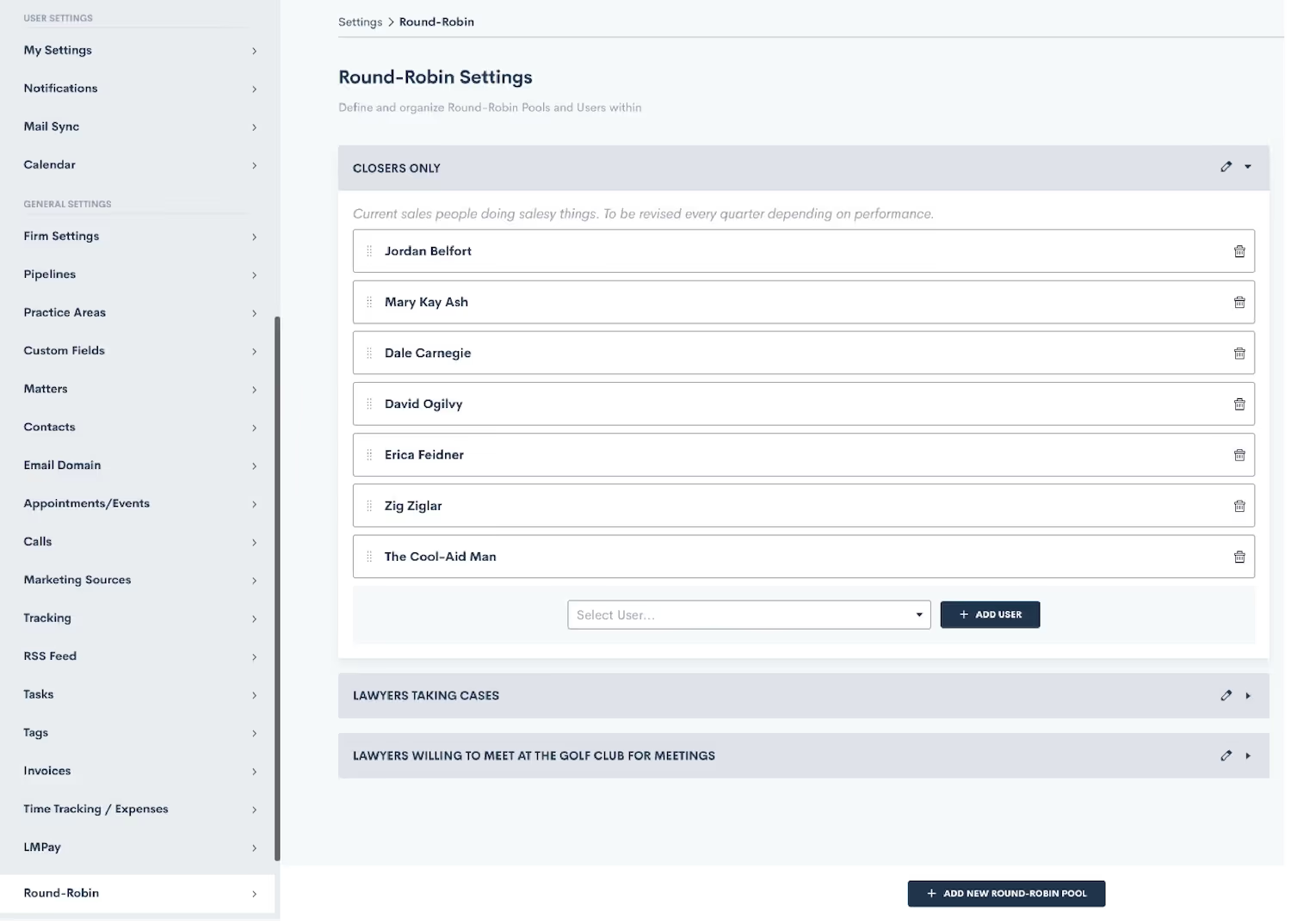
To learn more about Round-Robin settings click here.
Send one-off documents — without using a template
We’ve streamlined your document sharing process. Previously, sharing unique documents required uploading them as templates, even if they were single use. Now, with our latest update, you can bypass this step entirely for one-off documents. Navigate to the matter page, select “Send Document”, and upload your PDF. This enhancement simplifies the process, making it easier to share documents that are unique to a specific matter or contact without cluttering your template library.
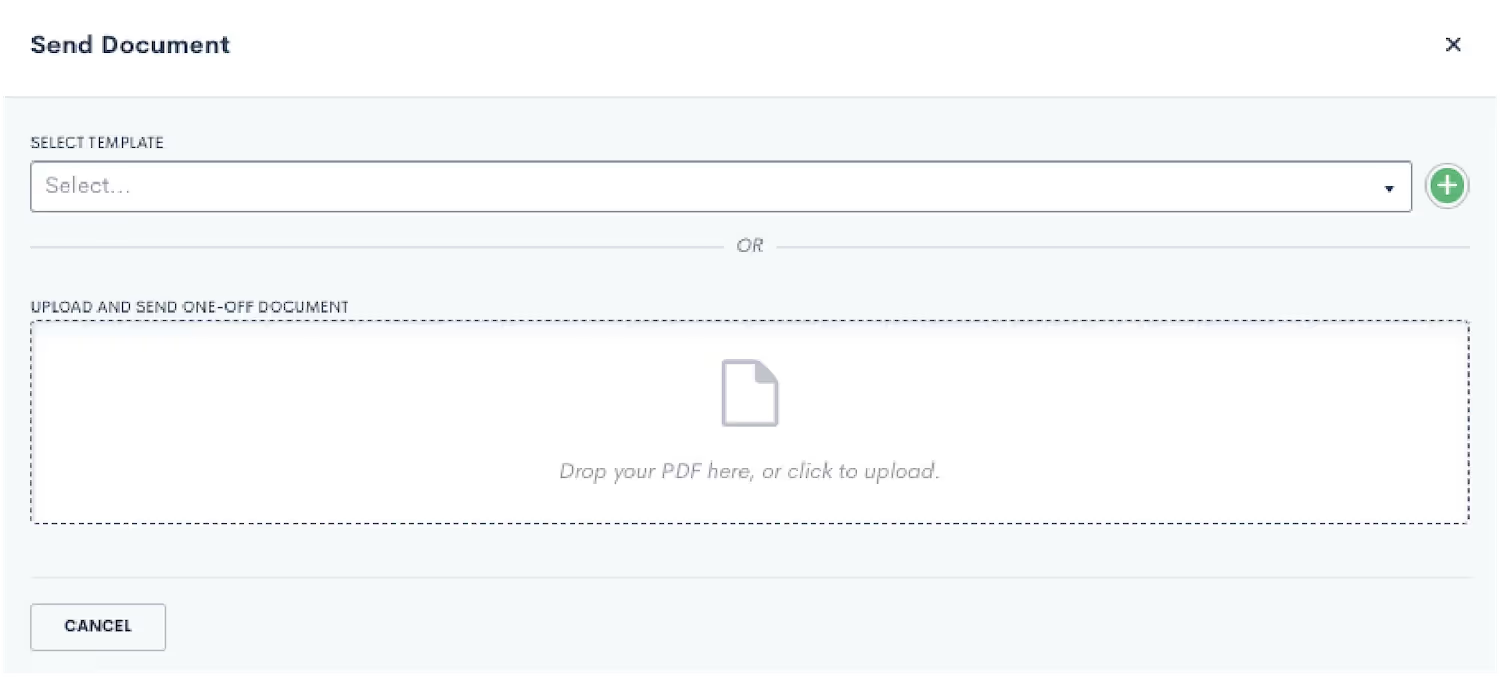
Learn more about how to send a one-off document here.
Quickly locate records and assets with overhauled search bar
Your CRM should keep your data and client information at your fingertips. We’ve overhauled our search bar to make it even easier to find what you need. New headers keep your searches organized so you can effortlessly sift through matters, contacts, companies, and clients. But wait, there’s more! Your searches now also include assets like forms, documents, emails, Automations, and more.
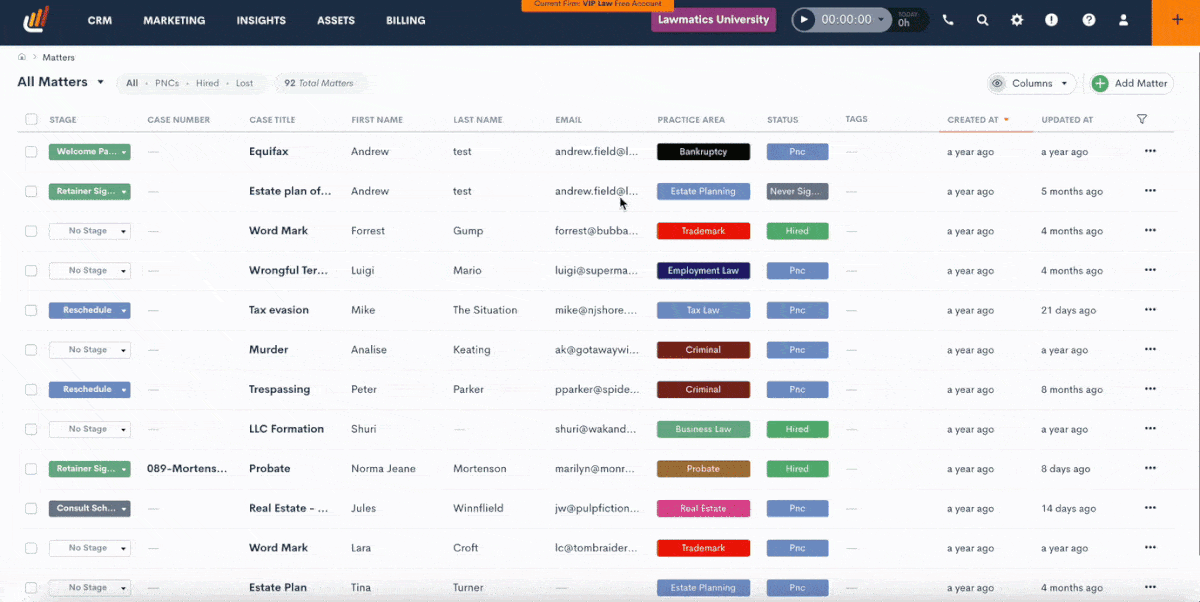
Filter custom reports with appointment fields
Now, you can easily track appointments within a specific time period and monitor your client conversion rates. With the inclusion of appointment-based fields as filters in your custom reports, you have the power to unlock deeper insights and enhance your reporting capabilities with appointment-specific data. Gain a clearer understanding of your business and make data-informed decisions to drive growth.
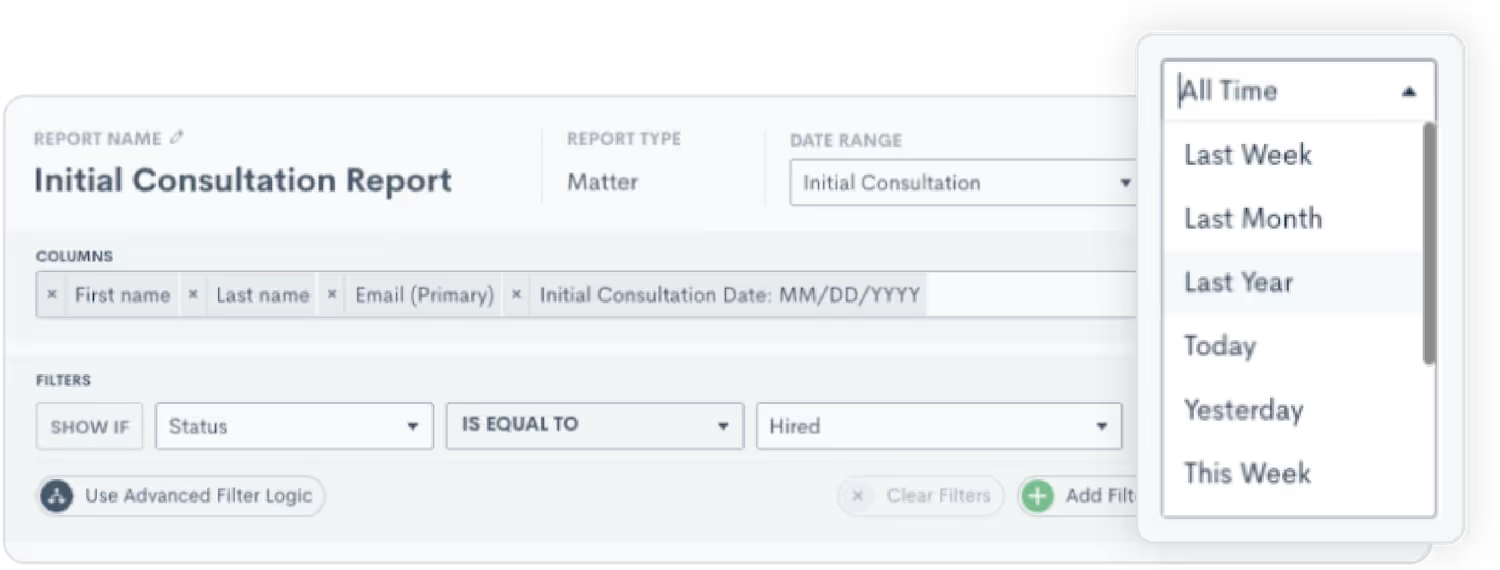
Explore custom report filters here.
Easily export trust account data
With one click, you can export your trust account page as a .csv spreadsheet. This provides a convenient option for law firms to maintain detailed records of their systems, and stay compliant with any state bar regulations regarding financial accountability.
NOTE: This feature is only available to our Time & Billing users.
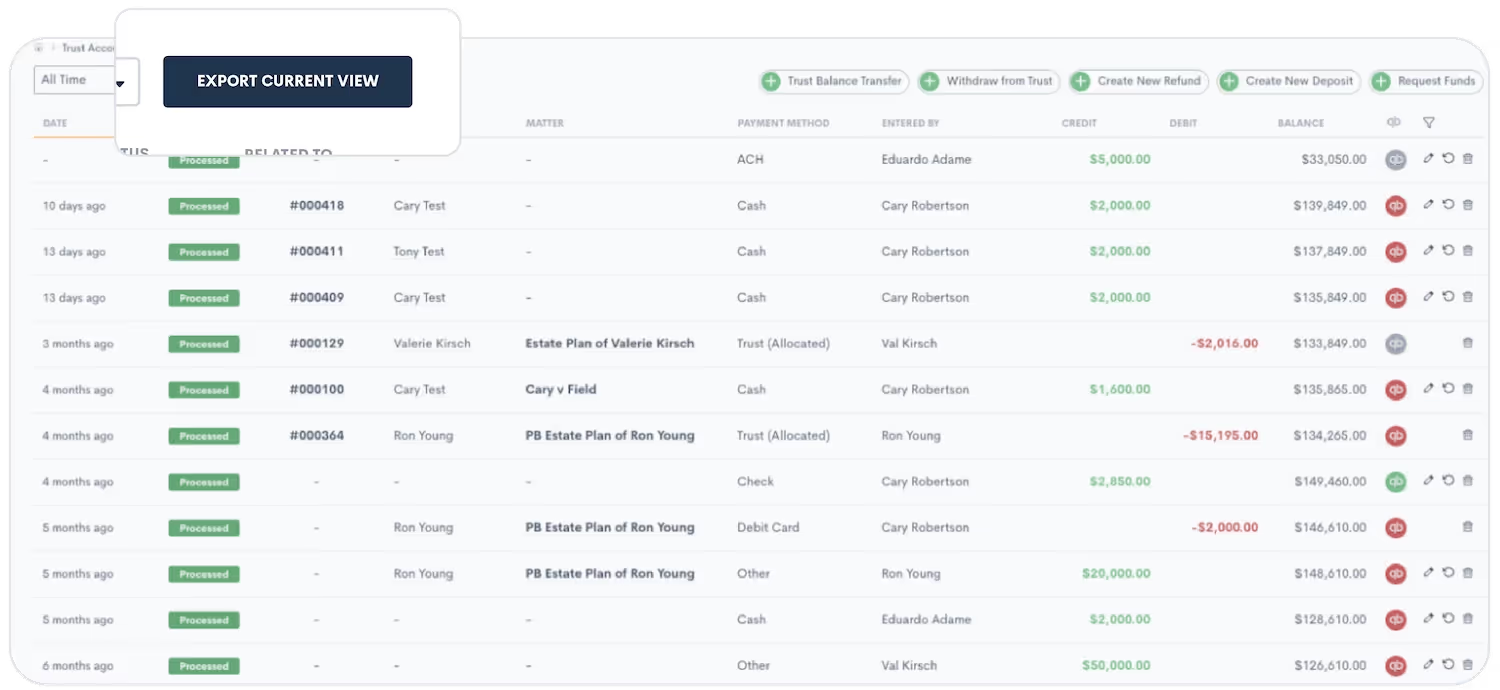
Learn more about trust accounts here.As always, we love your feedback and encourage you to reach out with any questions or suggestions. Thank you for being a valued member of our community. Together, we continue to push the boundaries of what's possible for law firms.Sign in or sign up to get started with Lawmatics today.
Subscribe to get our best content in your inbox
Ready to grow your law firm with Lawmatics?
Schedule a demo of legal’s most trusted growth platform.
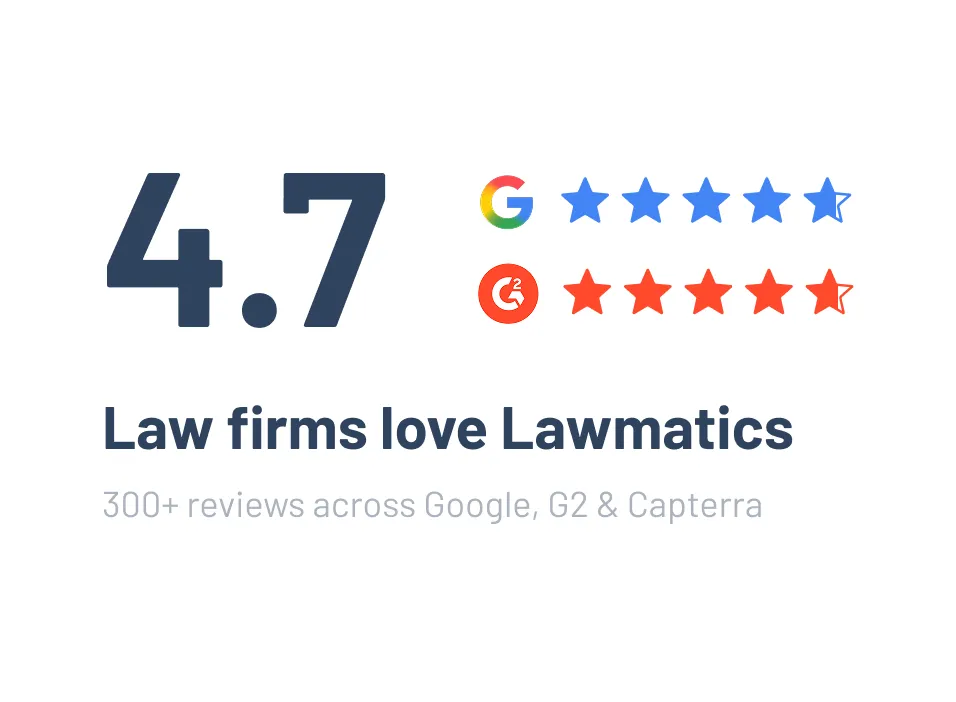




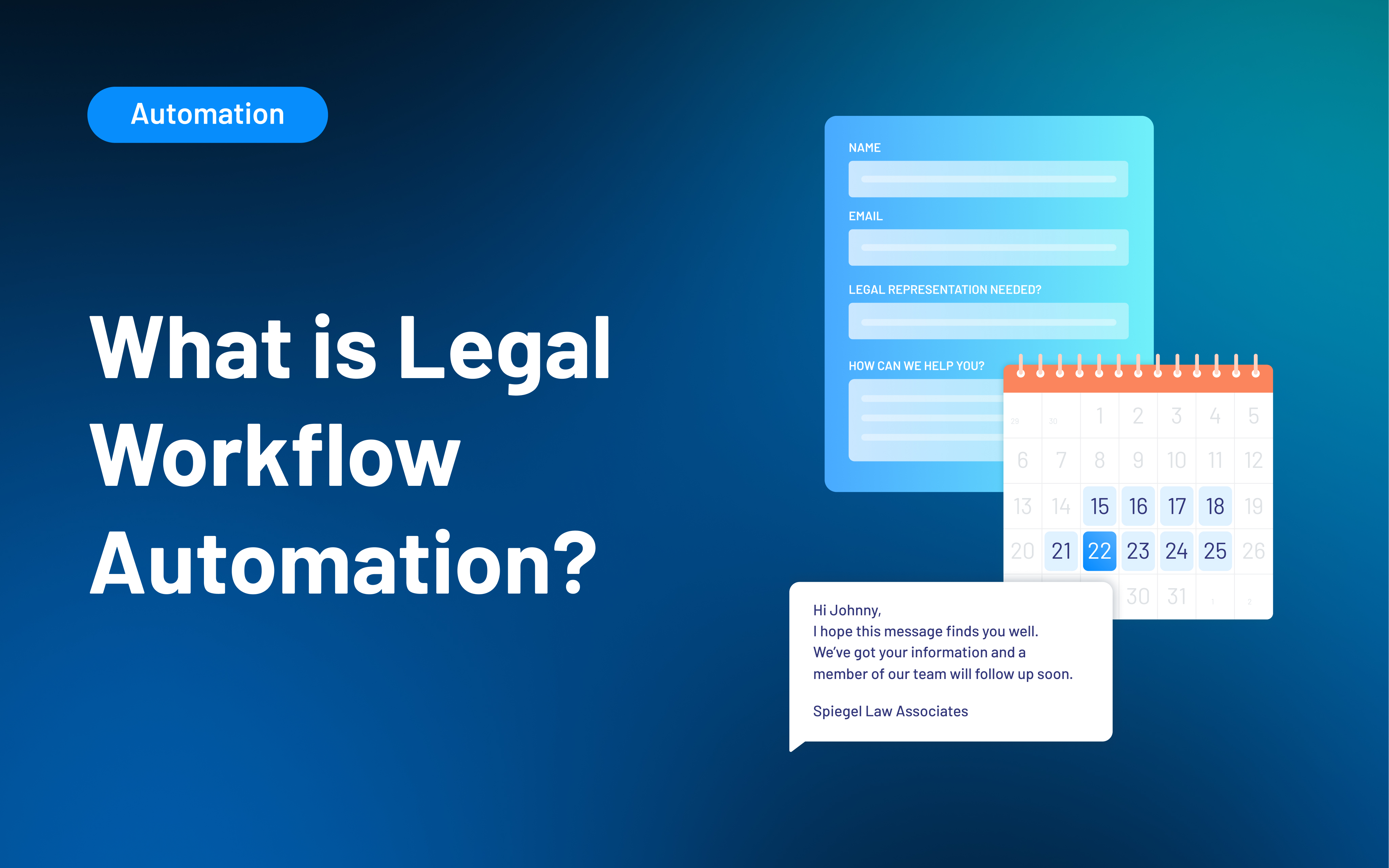





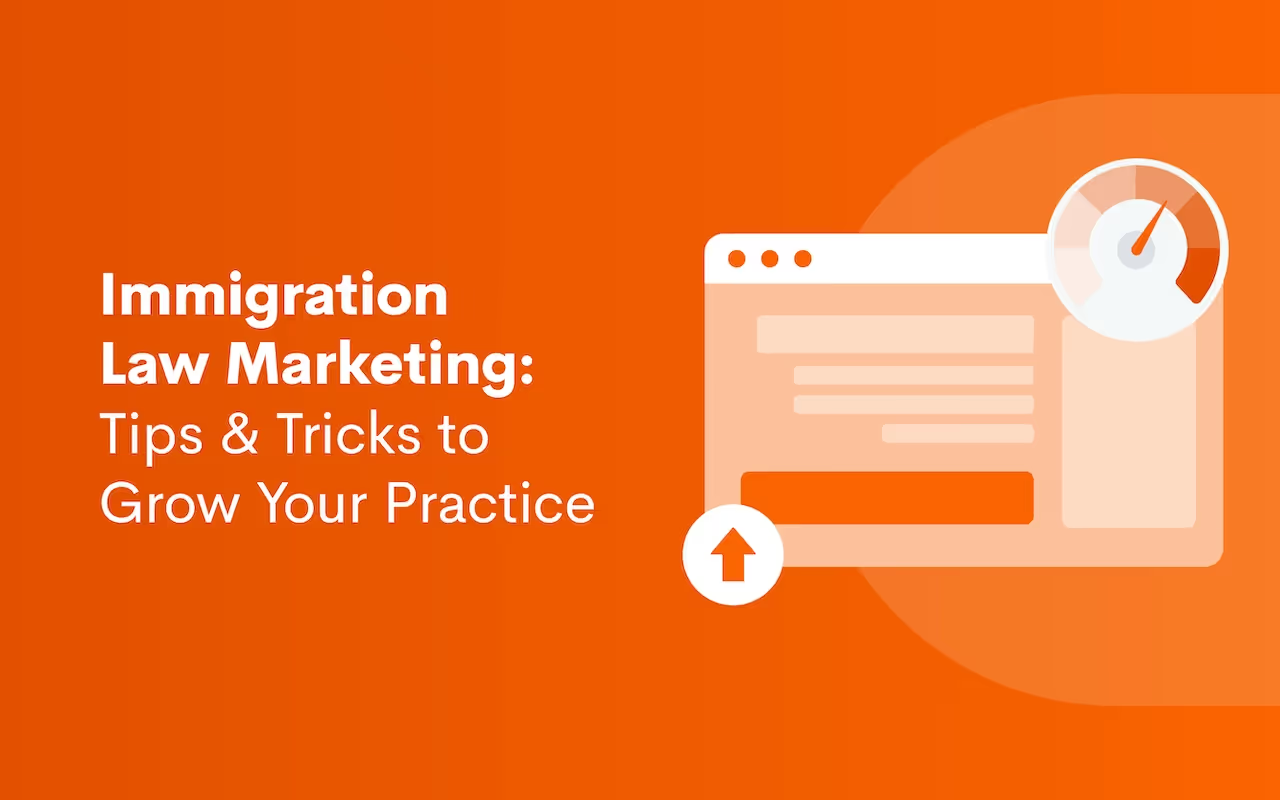

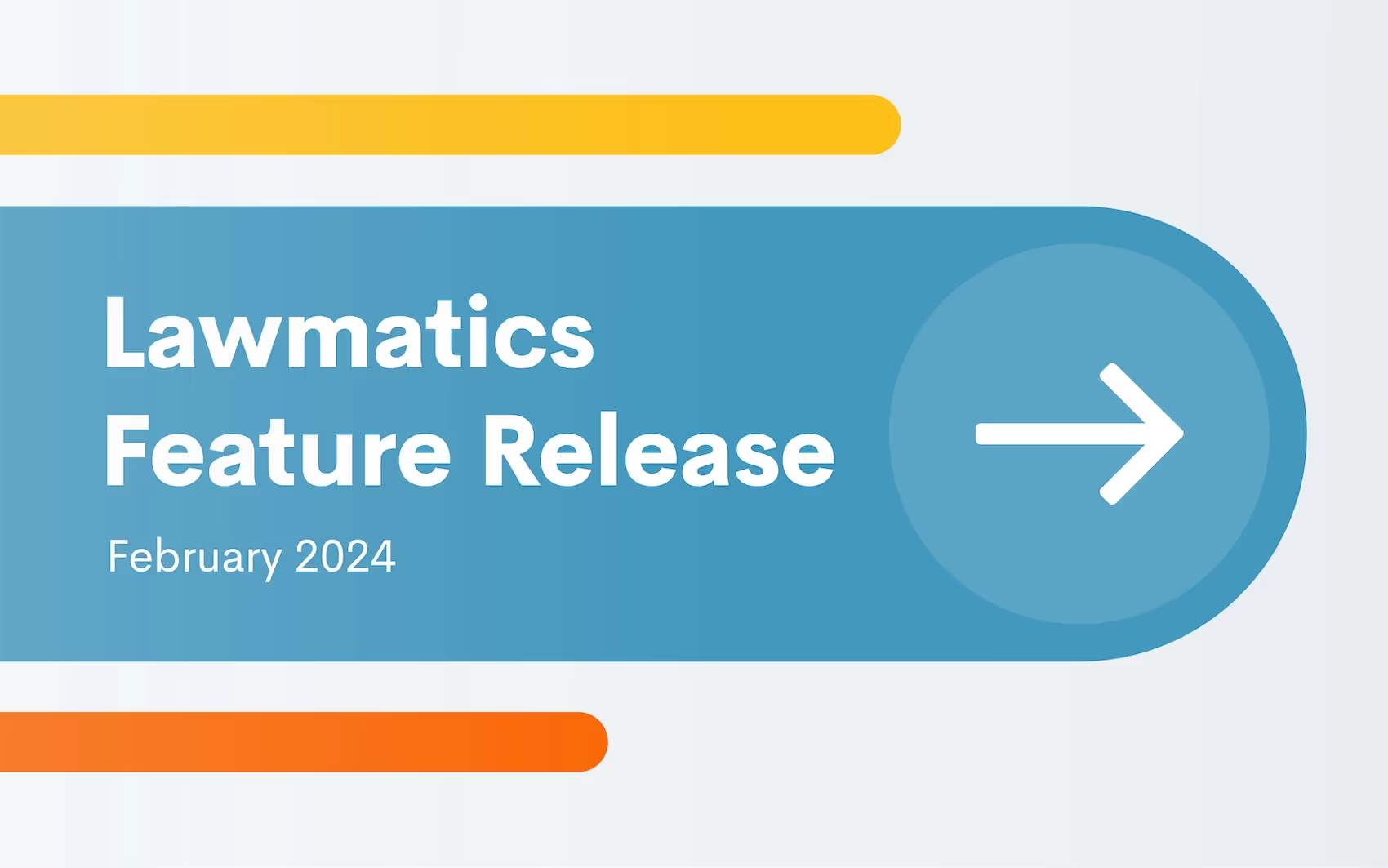
.avif)
.avif)

.avif)
